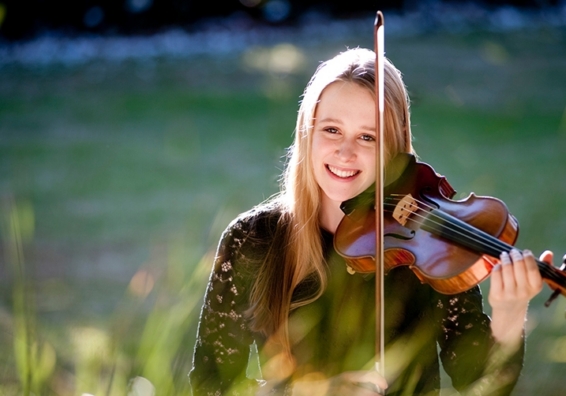Grace Clifford is accustomed to being in the media spotlight. The 18-year-old Sydney violinist has been winning competitions throughout her teenage years, climaxing with being named the ABC Symphony Australia Young Performer of the Year in 2014.
She has just started her third year at Philadelphia’s Curtis Institute and is preparing to return to Australia to be soloist with the Melbourne Chamber Orchestra playing Mendelssohn’s concerto and Vaughan Williams’ The Lark Ascending. She will then go on to play the Sibelius concerto with the Adelaide Symphony.
But her success has yet to bring lasting confidence. In a ‘phone call from Philadelphia Clifford says she still has moments of discouragement in the rehearsal room and faces the continual challenges of forming her own interpretation of musical classics.
‘’It is difficult to maintain the worth of new contributions to the musical world,’’ she says. ‘’It is hard to maintain perspective against the weight of history.’’
She finds consolation in her instrument, which was made by Jean-Baptiste Vuillaume outside Paris in 1859. ‘’That was the year Dickens wrote The Tale of Two Cities and Darwin published On the Origin of the Species. Musically that was the year Brahms premiered his first piano concerto. When I feel discouraged I find some perspective from this.’’
She could also look at her demand in Australia, where she played the Mendelssohn concerto with the Sydney Symphony earlier this year before coming to Melbourne in June to play Bruch’s first violin concerto with the Melbourne Symphony under Benjamin Northey.
‘’My main goal is to keep learning and to play as much as possible,’’ she says. ‘’It is difficult to talk about the future because nothing is certain about a music career.’’
She will be back in Australia in March next year for another tour with Kathryn Selby, who provided a pivotal musical moment when she made Clifford the first development artist of Selby & Friends in 2013 when the violinist was only 14.
‘’It was an unforgettable experience to play chamber music with professional musicians,’’ she says. ‘’It helped me realise that music involves so many different levels. There is the composer, the audience and my colleagues. It is all very spontaneous.’’
Selby had heard her perform in a concerto competition two years earlier, which provides a perspective of Clifford’s long experience with competitions. ‘’They are wonderful in providing short and long-term goals and for learning repertoire. That is their merit,’’ she says.
She won the young performers award playing the Beethoven concerto with the SSO, and the music remains her favourite. ‘’I was 15 when I learnt it and was naïve about the perceived wisdom that you should never tackle Beethoven until you are old enough and have learned some life lessons. It will always be special for me.’’
Her studies at the Curtis Institute have widened her musical horizons, and she is grateful she was preceded by another young Australian violinist, Ray Chen. ‘’Not many Australians come to Philadelphia, although there are three of us at the moment. That’s a lot.’’
She has been part of both the institute’s high school and bachelor programs and found both experiences challenging because she says Australia’s musical life is limited by comparison.
‘’Curtis is both small and international. There are up to 20 musicians I respect here, all teaching different traditions of playing Bach and Beethoven.’’
Her degree usually takes four years, but because of Clifford’s youth she is in no rush to leave. ‘’However long it takes I may try to stay on because there are so many different musicians from all over the world.
She feels it is an advantage she did not come from a musical family, although she grew up hearing music played because her brother, who is six years older, began learning when she was four. ‘’One of the things I miss most is our family dinner table conversations about current affairs. We were always engaged with world politics.’’
She believes this gives a solid grounding to her musical career. ‘’Classical music can be a sheltered environment but we aren’t likely to develop as artists if our experience is limited to the rehearsal room.’’
This perspective gives her an interest in concerns like climate change, because she says music and nature have always been linked from the very beginning. ‘’Even though the natural world is under threat from climate change, attempts to deal with it have been reduced to a political game,’’ she says.
‘’People who have dedicated their lives to scientific study and who have declared the world to be in danger are dismissed as irrelevant, That is disorientating and make it hard to sustain hope in the future.’’
She feels her talent is linked to the state of the wider world and feels it will not develop unless she is engaged to make the world a greater place.
‘’One of my strengths is that I never considered myself to be just a musician growing up,’’ she says. ‘’I was at high school fulltime until I came to Curtis and there was never just one moment when I realised I would dedicate my life to music. I have been so lucky so far and I am not looking too far ahead because it is a privilege to be doing what I’m doing.’’
Grace Clifford will perform Mendelssohn’s violin concerto and Vaughan Williams’ The Lark Ascending with the Melbourne Chamber Orchestra under Michael Dahlenburg at Federation Square’s Deakin Edge on November 18 and at the Melbourne Recital Centre on November 20. She will tour with Kathryn Selby next March.
By Robin Usher
Nov 2016 | 3MBS

